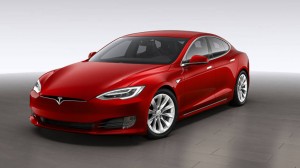They should be. If some of the projections about declining battery costs are accurate, battery-powered cars will be much cheaper (and better) than gas-powered cars within possibly the next decade.
Electric vehicles like the Tesla Model S are already outselling similar gas-powered cars in their class, and a new generation of mass-market, long-range EVs have arrived with the Chevy Bolt, soon to be followed by the Tesla Model 3 and the new Nissan LEAF.
As E&E News (paywall) reported, one bullish study from the Grantham Institute for Imperial College London and the Carbon Tracker Initiative suggested that electric vehicles could make up around 35 percent of the market by 2035 and two-thirds by 2050:
“The oil and gas industry feels that EVs aren’t anywhere past being niche products,” said Luke Sussams, a senior researcher at Carbon Tracker and one of the authors of the report. “The model shows what might happen if EVs are further along that S curve [of consumer acceptance], just before that inflection point of mass uptick.”
The scenario outlined in the report, which also includes an aggressive projection for solar energy, would see oil and coal demand peak in 2020 and fall through 2050. The amount of oil displaced by EVs could reach around 2 million barrels per day by 2025 — the same volume that caused the 2014-15 oil price collapse.
I’m bullish on electric vehicles overtaking gas-powered ones for two reasons: first, electric vehicles are superior to gas-powered ones in terms of performance and convenience (less maintenance and easy home fueling if you have a garage); and second, battery prices have declined remarkably just since 2010. I remember the days of $1000 per kilowatt hour in battery prices that year; now Chevy reportedly bought batteries for the Bolt at $165 per kilowatt hour.
But the oil industry may not be taking this challenge that seriously. I know someone who works at Chevron, and he told me had presented some of his superiors with an analysis on the “threat of EVs.” But the company, in his words, is run by old-style Texas oil guys. Oil is all they know, and they’re not in a position to transition the company dramatically to a completely different product.
My guess is the oil industry will have another decade or so of a good ride, but they’re facing diminishing market share. Policies like California’s low carbon fuel standard and zero-emission vehicle mandate won’t help them either.
If I worked for an oil company, I’d be advising them to figure out how to make money off this new paradigm. It’s coming more quickly than they may realize.



